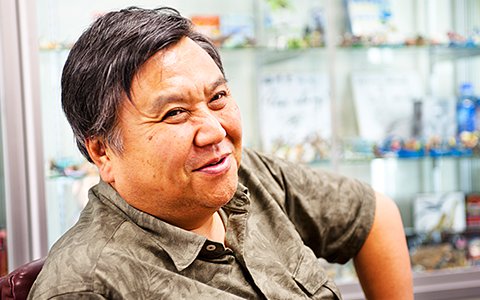A boom in action figure model kits and small toys. The 6th guest of route 2015 is Shuichi Miyawaki, the figure maker whose name thunders worldwide as the soldier of fortune within the model industry and managing director of Kaiyodo. His long association with and authorization for Evangelion began with the dawning of the garage kit and model event, “Wonder Festival.” Both things like anime and special effects, which simultaneously started a new business aimed at model-loving otaku, began to follow a different path roughly 30 years ago. On one hand, the anime and video game low production hit maker. On the other, the poor modeling group, calling itself incompatible with society. Approximately 10 years later, the gospel of Evangelion came to both in a downpour...

Representative Director
Company President
Shuichi Miyawaki (sennmu)
Born in Osaka in 1957. He began helping out as a middle schooler at a model store managed by his father, where he was affectionately called “big brother” by the children and admirers who gathered there. After that, he helped foster everything from model kits to the figure mold manufacturing technique, and in ‘99 he worked on the bonus figures included with Furuta Confectionery’s “Chocolate Egg,” which were huge hits. Alongside a charisma mold person (T/N!!!: Not sure how to translate this) from the same company, he made the name Kaiyodo known around the world. In ‘06 he went from the company’s managing director to company president, but is still known by the pet name “managing director.”
From the shops that sell them,
Japan’s best models
to Japan’s best modelling groups
“Small, one-of-a-kind model shops like ours can now shake up major companies as makers. Simply put, that’s the effect Eva had on us. Until then,a resin cast model kit was considered a big hit if we sold as many as 1,000 units total. When it came to Eva, the first lot might sell around 3,000 units, or simply 10-fold. To those of us who handmade around 50 kits at first for enthusiasts, that was world-changing, haha. Since ‘82 we had basically just been making models, but for the first time, we were able to have business-like business.”
Nowadays when you say “figures,” most people probably think of preassembled, PVC (polyvinyl chloride)-coated ones you can buy with ease at anime shops, but before Eva was first televised, you didn’t really have much of a chance to get your hands on faithfully reproduced, pre-assembled figures. It was common to get garage kits from small model shops like Kaiyodo at amateur model sales events and put those together and coat them yourself. Just 20 years ago, if you said “figure” in reference to a hobby product, it wouldn't ordinarily be recognized.
“Eva was also a work that spread garage kits as enthusiasts’ products to model shops nationwide. They weren’t soft vinyls or plastic models of monsters for children. They were generally acknowledged as high quality things called “figures” that could even be enjoyed by adults. Eva is called “Gospel Warrior” in Chinese, and that’s exactly what it was for model shops like ours.”
At first, garage kits weren’t products manufactured by toy makers. Beginning in the late 70s, they were made for fun by amateur enthusiasts unsatisfied with the quality of commercial hobby goods for themselves. It traces back around 50 years ago. Kaiyodo was started in Moriguchi, Osaka in ‘64 as a 1½ tsubo (T/N!!!: Not sure I got this right/wrote it how it should be written) model shop by Osamu Miyawaki, predecessor and father of Miyawaki. Through his creative management policies and love of models, its name became well-known across Japan for “selling the best models in Japan.” It got a fresh start after that in ‘82 as a model maker with garage kits as its leading product. Shinobu Matsumura, who also spread Kaiyodo’s name around the world with “Chocolate Egg’s” elaborate animal figures, and Bome, who now has fans worldwide for the charisma of his beautiful female figures, both visited Kaiyodo around that time as customers before betting their lives on figures and becoming sculptors. Before long, their presences were felt in places like the ameteur model marketing event “Wonder Festival” which began in ‘84.
“A company called General Products, the predecessor of Gainax who made Eva, created Wonder Festival. They had a workplace in Osaka and managed a shop that sold goods with a focus on garage kits and sci-fi anime. They were rivals, so to speak, with Kaiyodo, which is also in Osaka. At that time, they put actual pictures on the packages for their products, and it was very polished. I didn’t feel like my models would lose, but at the time I just put the finished kits in cardboard boxes, wrote their name with magic marker, and sold them like that, haha.”
Towards the end of ‘84 when Wonder Festival started, General Projects established Gainax in Tokyo as an affiliated company and announced the film “Ouritsu Uchuugun: Honneamise no Tsubasa.” After that, Gainax revealed itself to stand out as an anime and video game company. In ‘92 it merged with General Projects, and in ‘95 made the huge hit, “Neon Genesis Evangelion.”
“We accidentally succeeding following the anime path, but we’re still only good at making models. Even now, we’ve come as far as having our own company building, but until the mid 90s, it wouldn’t have been strange if we went bankrupt. Anyways, even though we’re poor, we can only make things we like, and we’ve just been doing as we please. But that turned out to be good, didn’t it?
The progress of Kaiyodo and Eva, both starting from similar fields. This 20-year journey they share is too rich in episodes for one book to tell. In route 2015, through an interview with the managing director, Miyawaki, we’ll introduce this story of both laughs and tears.

